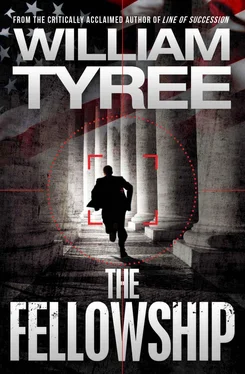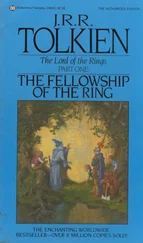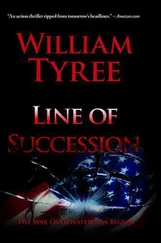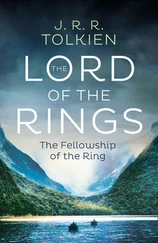William Tyree - The Fellowship
Здесь есть возможность читать онлайн «William Tyree - The Fellowship» весь текст электронной книги совершенно бесплатно (целиком полную версию без сокращений). В некоторых случаях можно слушать аудио, скачать через торрент в формате fb2 и присутствует краткое содержание. Год выпуска: 2013, Издательство: Massive, Жанр: Триллер, на английском языке. Описание произведения, (предисловие) а так же отзывы посетителей доступны на портале библиотеки ЛибКат.
- Название:The Fellowship
- Автор:
- Издательство:Massive
- Жанр:
- Год:2013
- ISBN:нет данных
- Рейтинг книги:5 / 5. Голосов: 1
-
Избранное:Добавить в избранное
- Отзывы:
-
Ваша оценка:
- 100
- 1
- 2
- 3
- 4
- 5
The Fellowship: краткое содержание, описание и аннотация
Предлагаем к чтению аннотацию, описание, краткое содержание или предисловие (зависит от того, что написал сам автор книги «The Fellowship»). Если вы не нашли необходимую информацию о книге — напишите в комментариях, мы постараемся отыскать её.
The Fellowship — читать онлайн бесплатно полную книгу (весь текст) целиком
Ниже представлен текст книги, разбитый по страницам. Система сохранения места последней прочитанной страницы, позволяет с удобством читать онлайн бесплатно книгу «The Fellowship», без необходимости каждый раз заново искать на чём Вы остановились. Поставьте закладку, и сможете в любой момент перейти на страницу, на которой закончили чтение.
Интервал:
Закладка:
Forgetting his fears, Wolf walked to the edge and peered over the side. Albert was a broken smear of skin and bones and flesh over a parked threshing machine. A large piece of torn netting was pinned between the body and the machine’s cylinder. The truncated ends were tied to nearby trees, flapping like windsocks in the morning breeze.
Now there was no sound except that of the wind and the breathing of the other boys and their footsteps as they took turns walking to the edge to see Albert’s body. They had all, of course, seen other dead children. Outbreaks of flu, tuberculosis, whooping cough and smallpox routinely thinned the ranks. But to see a cadet die in this way was truly novel. But Wolf detected no evidence of pity in the other boys. The boys’ overriding emotion seemed to be fascination. Except Lang, of course. He had always been a sensitive boy. Even now, his body convulsed as he tried to suppress his tears.
The sharp report of a pistol broke the silence. Wolf’s eyes snapped toward the ground in time to see Beck’s breath cloud the chilly air. Then Beck fell face-first onto the field. The trigger man stood over the body. It was Heinrich Himmler.
*
The unit was relieved of duties until lunchtime. Lang held himself together until he and Wolf returned to their room. The sight of Albert’s bed and footlocker set him off. Wolf stood by idly as Lang came unglued, unsure whether he was more upset by the force of his friend’s emotion, or by the lack of his own.
When Lang finally gathered himself, he said, “I’ll go first.”
Wolf went to the door, leaning against it and holding the doorknob tightly with both fists. With the door secured, Lang kneeled before Albert’s bed and began to recite a psalm.
This act — standing guard for each other during prayer — was a daily ritual. The two boys shared a secret. They were practicing Catholics.
Being Catholic was not yet an official crime, but Wolf knew that someday soon, it would be. He had not seen a priest since 1939, when the government had closed the Catholic school he and Lang had attended in Munich, and along with it, every parochial school in the country. Their parish church had been closed later in the year and converted into a government building. And yet priests still presided over the weddings of high-ranking German officials, a fact he knew only because of occasional photographs in the newspaper. It was all very confusing.
When Lang was done, Wolf took his turn kneeling at the foot of Albert’s bed. He clasped his hands before him, but when he closed his eyes, he did not see Albert, and he certainly did not see God. He instead saw Himmler, eyes peering through wireframe glasses, standing over Beck’s body. Resting his boot on the man’s chest as if he were a hunting trophy. He then looked up at the barn and saluted the boys on the rooftop. I punished this man for his negligence , the gesture had seemed to say. I did this for you, boys. This is how much you mean to the Fatherland .
*
Later that morning, the cadets washed and dressed in brown shirts, brown pants and black ties. Although they were too upset to feel hungry, the daily rituals of the Reich School remained unbroken. When Wolf and Lang made their way to the dining hall, however, they quickly found their appetites as they sat down to a lunch of smoked trout, potatoes and milk.
“Something’s up,” Lang said as he regarded the meal before him with suspicion. Although the students at the Reich School had the best of everything, to see fresh fish was unheard of. The whole of Germany had been on rationed food portions for some time. The Minister of Propaganda, Joseph Goebbels, had recently set civilian rations of meat at one-tenth of one pound per day and had also downgraded portions for bread. Vegetables were impossible to find, especially in the cities.
“Putting on a show for Himmler,” Wolf speculated.
“No,” Lang said. “Himmler’s been here before. He’s impressed by performance, not nutrition.”
Wolf bumped Lang with his elbow and motioned across the dining hall. Two soldiers were erecting a poster depicting a proud cadet brandishing a dagger. The slogan read:
THE SONS OF GERMANY GIVE THEMSELVES FREELY FOR FUHRER AND FATHERLAND
“You’re right,” Wolf said. “Something is up.”
*
In mathematics, Wolf and Lang sat before a slab of varnished pine that was angled at 15 degrees. There were 39 other students in the class. Albert’s chair was empty.
The math instructor had written this word problem on the chalkboard:
German armor enjoys vast superiority over Soviet ground defenses. At an average loss rate of just three German tanks in exchange for the destruction of 35 Soviet pillboxes, how many tanks would be required to break through a front line consisting of 607 pillboxes?
Wolf opened a black leather-bound notebook and began to work out the problem with a deftly sharpened pencil. Academically, Wolf took after his scholarly father, who had, before the war, been a professor of Indo-Germanic studies at the University of Munich. Wolf was far above average in all subjects, but especially in biology, math and foreign languages. He credited his early education for this, having studied under a handful of strict, but scholarly, Jesuit teachers, all of whom had been excellent linguists and mathematicians.
But the Reich School curriculum had dulled Wolf’s passion for numbers. The mathematics problems were always war-centric. He found these exercises disturbing. When party leaders spoke about the French threat, or the Russian threat, Wolf felt anxious, like all Germans. But he did not possess the bloodlust of the other cadets. He had no desire to kill. He wanted to teach in a university, like his father.
Lang edged closer to Wolf’s elbow, sneaking peeks at the equation. He was not a particularly gifted student. He had gained admittance to the school primarily through his strength as a sprinter. Until the war had broken out, he had been considered a lock for the track and field team in the 1944 Olympics, which were to be held in London. The war threatened to ruin all of that. They spent hours each week discussing it. What if Churchill was beaten by 1944? If London could be occupied and secured by then, couldn’t the Olympics then go on as scheduled?
Confident that his calculations were correct, Wolf left his notebook open for Lang’s wandering eyes.
Minutes later, the math instructor stood, his walrus-like torso filling the space between his desk and the chalkboard. “Stand up!” the instructor barked. “Leave your tests where they are! We will march in an orderly fashion to the gymnasium.”
A confused silence fell over the room. The cadets were scheduled to be in class for another 40 minutes. “What’s going on?” Wolf whispered.
“Told you,” Lang said quietly. “Something’s up.”
They filed out of class and crossed the athletic field en route to the gymnasium. It was already crowded with students. Red tapestries featuring enormous swastikas hung from either side of a stage. A pianist manhandled an upright piano, playing a Wagner-esque march that Wolf recognized as one of Puzzi Hanfstangel’s compositions for Hitler. He had last heard it at the annual midnight rally in Munich’s Odeonsplatz — a large outdoor plaza just outside Munich’s urban palace — where thousands of newly minted SS officers pledged their loyalty to the fuhrer.
Lang, the taller of the two boys at six foot three, stood on tiptoe and peered over the crowd. “I see Himmler,” he said. “Vogel is there too.”
They were suddenly pushed by a wave of students arriving behind them. Older boys who lived in one of the other school houses. The crowd surged forward, then sideways. Wolf was swept toward the far wall. He had lost Lang. In an institution that did everything in an orderly fashion, this was an unusual moment of mayhem.
Читать дальшеИнтервал:
Закладка:
Похожие книги на «The Fellowship»
Представляем Вашему вниманию похожие книги на «The Fellowship» списком для выбора. Мы отобрали схожую по названию и смыслу литературу в надежде предоставить читателям больше вариантов отыскать новые, интересные, ещё непрочитанные произведения.
Обсуждение, отзывы о книге «The Fellowship» и просто собственные мнения читателей. Оставьте ваши комментарии, напишите, что Вы думаете о произведении, его смысле или главных героях. Укажите что конкретно понравилось, а что нет, и почему Вы так считаете.











